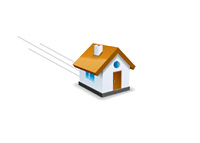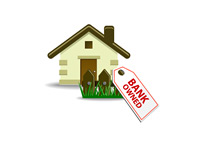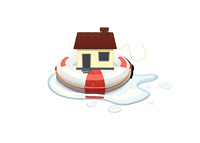How The Internet Bubble Was Similar to the Housing Bubble
 There are actually quite a few similarities between the Internet bubble (last half of the 90's until mid 2000) and the most recent housing bubble in the United States. By drawing similarities between the two bubbles, you can start to see the warning signs that you can keep in the back of your mind for the purpose of identifying future bubbles.
There are actually quite a few similarities between the Internet bubble (last half of the 90's until mid 2000) and the most recent housing bubble in the United States. By drawing similarities between the two bubbles, you can start to see the warning signs that you can keep in the back of your mind for the purpose of identifying future bubbles. 1. Ridiculously Inflated Values. When you are in the midst of a bubble, it can be quite easy to lose your money. During the Internet bubble, you had companies with valuations of many billions of dollars that didn't even have a PLAN for profitability. Their business model? Lose as much money as we possibly can building our "brand", and worry about profits later. People poured billions of dollars into these companies, and eventually the whole thing collapsed. The housing bubble was less egregious, but still produced hyper-inflated home values that people should have been wary of. Home values simply don't rise 30% a year, but many people came to accept this as a rule, rather than an exception.
2. Excuses for High Values. During the first Internet bubble, you heard people say things such as "It's a new paradigm, these valuations are justified" and "Profitability doesn't matter." During the housing market bubble, you heard "The housing market will always rise because land is finite". Well, the valuations weren't justified, profits do matter and the housing market won't always rise.
3. The Bubble Penetrates the Mainstream Media. During the first Internet bubble, CNBC saw record ratings. TV shows, based on the stock market, were launched on Fox and NBC. Radio shows popped up, dedicated to making money on the stock market. The same thing with the housing bubble - how many television shows launched in the past few years, dedicated to home improvements, home flipping and home buying/selling? Media outlets aren't stupid - they know what's hot, and they'll tailor shows towards the bubble. This just feeds the frenzy even more.
4. People Needing to Get Involved at Any Cost. During the first Internet bubble, you had people taking out large "margin" loans to get involved in the red-hot stock market. This resulted in disaster for many people when the market topped and then plummeted. The housing market is no different - you had liar loans, teaser loans and stretch loans, all designed to get people into homes that they couldn't really afford. Sure, you could blame the companies for offering up these loans, but they were only catering to the demand. People wanted in at ANY price, and it was no different with the Internet bubble and the housing bubble.
5. Panic Buying. "I can't possibly wait any longer, I HAVE to get in." "If I don't get in now, I'll be priced out of the market forever". Sound familiar? It happened at the turn of the millennium with the stock market, and it happened again with the housing market. People HAD to get involved, even if values were already grossly inflated. Why? They didn't want to miss out on the next leg up of the market. Call it greed, call it whatever you want, but panic buying was certainly a similarity shared between the two bubbles. Panic buying usually marks the top of the market, as the herd is usually wrong.
6. Contrarians Treated as Idiots. If you thought that the stock market was destined to fall in early 2000, then you were treated as an "idiot" and someone who was out of touch. You just didn't "get it". People were spoke out against the housing market were "just mad" that they didn't get in early enough and were now hoping to "talk down the market".
7. Devastating Effect on the Economy. When both bubbles popped, the resulting impact was devastating to the economy. Trillions of dollars of net worth were wiped out. There were much less in the way of revenues to collect federal and state income tax from. States that had grown reliant on the surge in revenues were now forced to scale back their spending. Jobs were lost. Lives were ruined. Many companies were forced to make huge write-downs.
8. Scandals Galore. One constant with bubbles - there were always be people and companies looking to take advantage. During the Internet bubble, you had all sorts of different scandals, many involving publicly traded companies and even the analysts that were covering the companies. Well-known brokerages publicly hyping companies while trashing them behind the scenes. All sorts of stock fraud. With the housing market, there are many more scandals, some of which surely haven't even come to light as of yet.
9. Passing the Blame. Whenever a bubble pops, blame is always passed around. It's always someone else's fault.
10. Excellent Values Emerge. Whenever a bubble deflates, good values always emerge for the patient investors. When the stock market collapsed after the Internet bubble was popped, all sorts of great values emerge. The baby was thrown out with the bathwater - many good, solid companies were way oversold as investors simply threw in the towel. The same thing is going to happen in the US housing market - many great markets will become oversold, and the savvy, patient investors will make a killing.
Filed under: Real Estate News | The Economic Meltdown | General Knowledge



